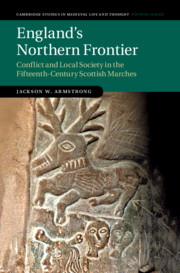Book contents
- England’s Northern Frontier
- Cambridge Studies in Medieval Life and Thought
- England’s Northern Frontier
- Copyright page
- Dedication
- Contents
- Figures
- Maps
- Acknowledgements
- Abbreviations
- 1 Introduction
- Part I
- Part II
- 4 The Nobility, Gentry and Religious Houses
- 5 Lordship, Kinship and the Surnames
- Part III
- Bibliography
- Index
4 - The Nobility, Gentry and Religious Houses
from Part II
Published online by Cambridge University Press: 30 October 2020
- England’s Northern Frontier
- Cambridge Studies in Medieval Life and Thought
- England’s Northern Frontier
- Copyright page
- Dedication
- Contents
- Figures
- Maps
- Acknowledgements
- Abbreviations
- 1 Introduction
- Part I
- Part II
- 4 The Nobility, Gentry and Religious Houses
- 5 Lordship, Kinship and the Surnames
- Part III
- Bibliography
- Index
Summary
Before proceeding any further with our analysis, this short chapter offers an overview of the landowners of the northern marches. By 1399, the greatest border lords were relative newcomers. Fourteenth-century warfare had eliminated the cross-border landownership which been prevalent in the thirteenth century and had led to an increasing level of seigneurial absenteeism. The Percy earls of Northumberland (created 1377, and who suffered forfeitures in 1405–16 and 1461–70) were the only magnates frequently resident in the far north-east. However, as great magnates, their other responsibilities meant they were seldom in the marches for long. The family had gained extensive lands in Northumberland during the fourteenth century (including the baronies of Alnwick, Warkworth, Beanley, Langley and Prudhoe, and the manors of Rothbury, Corbridge, Newburn, Thirston, Newham, Ellingham and Newstead). Their territories included the ‘Talbot Lands’ within northern Tynedale, which alone extended to nearly 6,000 acres. In Cumberland, they had also acquired Egremont and Cockermouth. The sons of the second earl of Northumberland maintained a family presence in the marches: Thomas (Lord Egremont from 1449) was active on the family’s Cumberland estates in the 1450s; Henry (Lord Poynings from 1446 and third earl from 1455) was warden of the east march and keeper of Berwick from 1440; Sir Ralph (d. 1464), was active in the 1450s and early 1460s as deputy and later constable of Dunstanburgh Castle.
- Type
- Chapter
- Information
- England's Northern FrontierConflict and Local Society in the Fifteenth-Century Scottish Marches, pp. 109 - 118Publisher: Cambridge University PressPrint publication year: 2020

